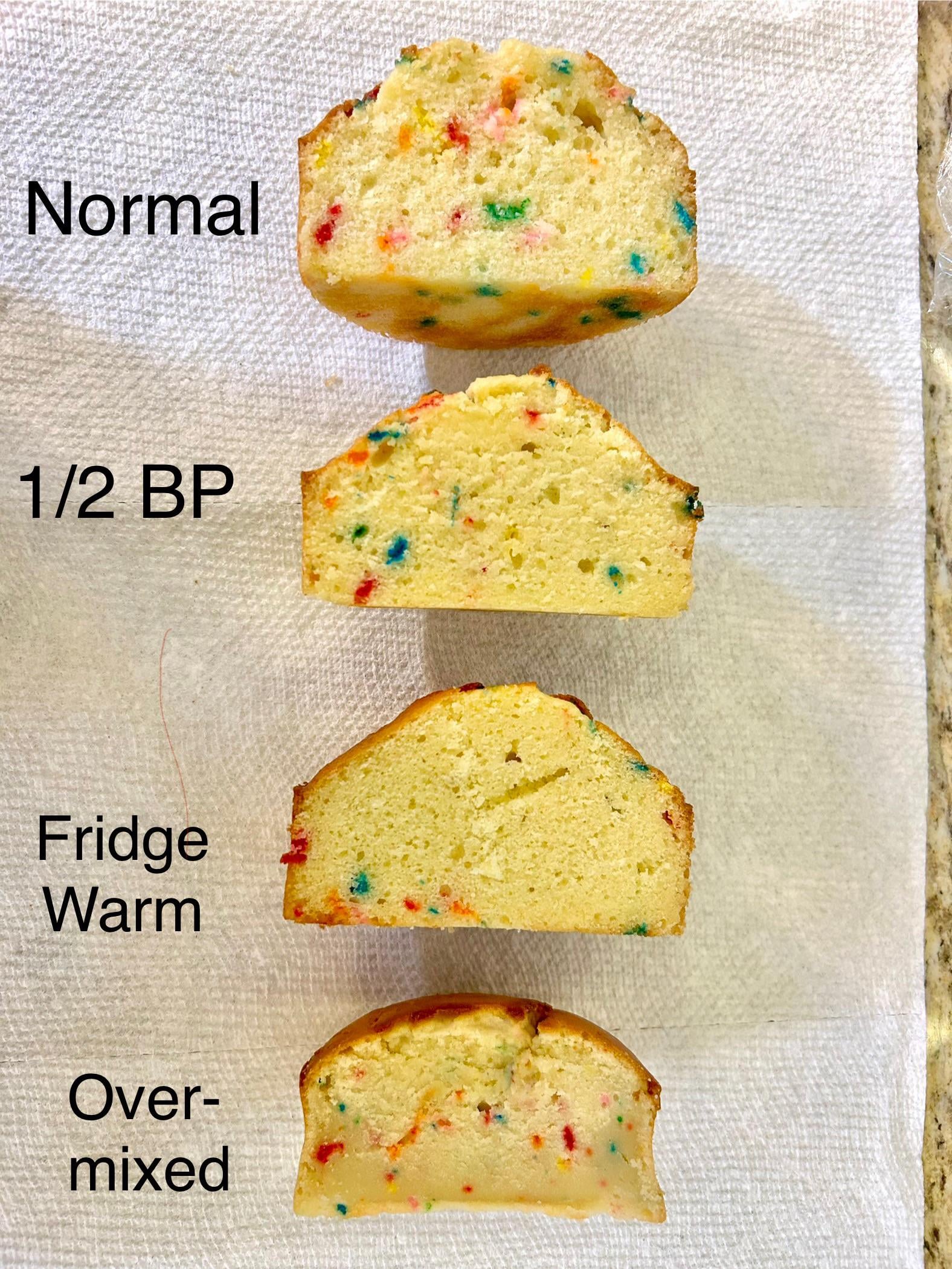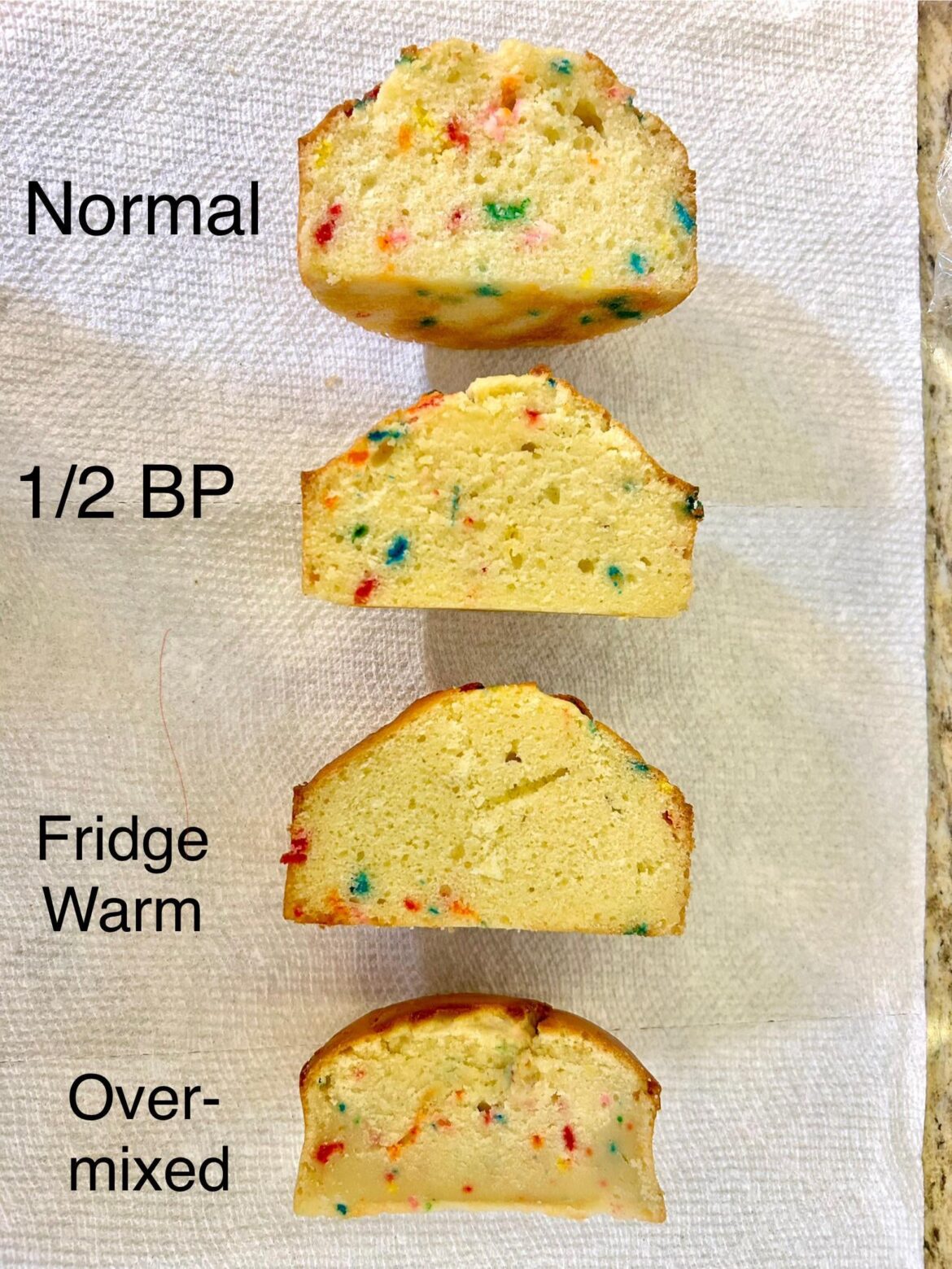
TL;DR: Severe overmixing makes a big difference, could be bigger than expired/dead leavener depending on how expired.
——-
I see lots of posts, on Reddit and other places on the internet, troubleshooting cakes that are too dense. Often people show up to say “definitely over-mixed”. Never having an overmixing problem myself, I was always skeptical of this. “Isn’t it more likely to be a leavener issue?” I wondered. So rather than wondering, I did a science experiment!
Method:
I used a basic yellow cake recipe with no fancy steps. Regular creaming. (happened to be from Preppy Kitchen, but that was just the first well-reviewed one I found that fit the criteria.)
I had a control group (normal cake) and three test groups. The test groups were:
1/2 the recommended amount of baking powder
Cake taken out of the oven and, while still very warm, wrapped in plastic wrap and left in the fridge for 5 hours. I included this one because I’ve seen a lot of soggy dense cakes from people doing this.
Batter overmixed at the wets+drys step for 5 minutes on high
All other conditions were controlled (precise weighing of ingredients; bake length standardized to a temperature probe of 200F; best I could with sitting/resting times of batter and rotating cakes through parts of the oven)
My hypothesis was that the baking powder condition would cause a denser cake than the other two.
Results:
My hypothesis was disproved! The overmixed cake was much denser. Here’s more detail on how they came out, because it isn’t all visible in the pics:
1/2 BP: shorter than the control cake and developing some wet/dense spots at the very top and bottom. Surprisingly okay, though.
Fridge when warm: cake is overall denser and less airy. The crumb has collapsed some and when you poke it, there is no longer any springy “give”. There is starting to be some dense layer at the very bottom, maybe 2mm.
Overmixed: I could tell this was going to be weird even before it went in the oven. The batter felt super liquidy and was higher-volume compared to the others even with the same amounts of ingredients and similar resting time. It looked less yellow. It took about 5m longer than the others in the oven to come to “done” temp (200F). The cake in the end was concertina’d with a clear rubbery layer at the bottom. It was the only one that my house declared inedible and threw out.
Conclusions:
Don’t overmix your cake like heck! These results lend credence to the method of either mixing in the wets and drys manually (what I normally do when I’m not doing science) or combining with the mixer on low only until entirely incorporated.
In the future if I do this experiment again, I will try a more reasonable amount of overmixing (simulating what someone might do by accident) vs even less baking powder (simulating someone working with near-totally dead baking powder).
by charcoalhibiscus


43 Comments
love a good cake experiment. the science of baking is wild. it’s like chemistry we actually get to eat. overmixing is a sneaky villain. thanks for the breakdown, now i have an excuse to bake more cakes. science, right?
Nice to see! I did a baking class and was explicitly told to wraps cakes and fridge/ freeze after baking to make them cool so the cakes “stay moist”. I don’t really mind the texture change but I’m defo going to try my own experiment so I can decide what to do going forward.
My banana bread and pumpkin cake always turn out like your over mixed one.
I thought it was too much liquid, but maybe I’ve been overmixing.
[deleted]
Thank you for your service.
This is very interesting because I am used to overmixed batters having those vertical wormholes… what I think is happening is so much mixing completely fizzes out the baking powder before it even gets in the oven. As it foams, the air is being worked out all in the bowl! Like pouring a soda back and forth between two cups until the fizz is gone.
I really never considered people are mixing that long and also always blamed dead leavening.
I even see cooking instruction on tv and pretty prestigious online content keep going and going after they are more than done mixing. Not overmixing was something I had beaten into me as a kid in Home Ec class.
Thanks for posting, this is fascinating!
People stick very warm cakes in the fridge?!
I mix everything by hand (except egg whites) so I’ve never really seen over-mixing, this is fascinating!
I’m a big believer in doing a cream first: (sugar and butter for about 5 minutes med.)
Sift all the dry ingredients especially baking soda. Baking powder too, but baking soda especially clumps up.
Main thing is don’t overmix the egg. One at a time, low speed until combined. Then half the dry mix, half the wet mix, repeat until just combined. Then scrape the sides and let it go on medium low for maybe 20-30 seconds. Too long and it gets dense
I cannot thank you enough for taking the baking bullet for the rest of us.
I would bet the majority of people reading your post have been guilty of over-mixing at some point, without even knowing it. Now we know to be more mindful, seeing it laid out so plainly like this!
As a general rule of all baking just barely mix it. Just enough to combine.
This is such great info! I also have never suffered from overmixed cakes, so I’ve been somewhat skeptical… been baking since the early 90s as a tween and not overmixing was hammered into me by every recipe and cook book, so if anything I have a tendency to under mix. This clearly demonstrates the effect!
I’d love to see the difference with slight/accidental overmixing (maybe an extra 30 seconds on medium?) vs aggressive intentional overmixing.
Interesting! I realized I left out an ingredient on a cake I made last year right before I put it in the cake pans. I had to double mix it to get the ingredient incorporated and my cake turned out super dense/rubbery like your overmixed one. I never really thought it was as big of a deal until it turned out so poorly.
I’ve only just started my baking odyssey so I thank you for your service. The dangers of over mixing should be taught in grade school.
This was very interesting! Thanks for your service!
Yeah this has always been one of my first go-to’s when I notice a badly misshapen and poorly distributed bread, it’s almost always too much or too little mixing. Other factors like bad leavening can definitely contribute to the problem on top of that, as can temperatures and altitude causing a need for adjustments, but the bottom line is, how you mix and/or knead your bread makes a *big* impact.
For science, I’m gonna need you to repeat this process a dozen more times.
As a scientist and baker I love this! Science that you can eat is the best, thanks for making baking nerdy 🤓
Very interesting!
Very interesting!
I somewhat learned this making macarons. Its effect seems exaggerated with the meringue. I had a big batch split into sub batches of different colors. I overmixed one subbatch (ube) and it was impossible to get the shape because it was so liquidy; while the others (mango/strawberry) that I only lightly folded turned out okay.
Bottom picture gave me PTSD. My neighbor’s recently brought over a Bundt cake the other day that was extremely over mixed. I don’t know what kind of cake it was supposed to be, but it was chewy and soggy at the same time. I had to pretend to like it to save face, but I was gagging internally
Weird question, but for cakes where you mix wet ingredient separate from dry, can I overmix the wet? I always fold in the dry, but use my stand mixer to make the wet ones consistent.
THIS POST IS STRUCTURED LIKE A SCIENTIFIC RESEARCH PAPER I love this so much
I sense a scientistttt
What is fridge warm? 🤔 I love to bake, dont know all the terms but I do like science! 😂🥰
I love the way this is formatted like a lab report. Thank you for sharing your findings!
I love this! Thanks for sharing 🙂
Ah but what about dead leavened AND overmixing. You clearly don’t know how to fuck up a cake as badly as I do
THIS IS WHY I LOVE BAKING AHAHAHAHA SCIENCE ALL THE WAYYY 🥳 thank you for sharing your results!
Thank you for posting your findings! That looks like a good science. 👍
Love it. All about experiments.
how long did you rest the batter before baking?
I learned this experiment in 70s as an apprentice .
I love that you did this. Thank you!
This is amazing! I love the science of baking (and cooking). I’m still a pretty novice baker and I recently made vanilla cupcakes from Sally. I have an old Sunbeam mixer my MIL gave me but it was missing the regular mixers (it had the beaters that you’d find on a hand mixer). The cupcakes came out pretty dense but not terrible. I don’t think I overmixed, but I think using the wrong type of beaters/mixer utensil led to a denser cake than is ideal for a fluffy vanilla cake. I went on eBay and found replacements and plan to make them again this weekend. Yay for science!!
ETA: Oh yeah, forgot to mention, I put them in the fridge after they’d cooled and been frosted. They got even more dense after being in the fridge, not by a lot, but noticeable to me.
Very cool! Thank you for sharing! How long was the control cake mixed and at what speed?
Also, the control looks yummy. How was the recipe in general? Would you recommend it as a good yellow cake?
Yummy science
Nice control!! 🤣 totally publishable with more reps!
Really excited for your follow-up experiment!!
Thank you!!
Now I know what happened to my lemon cake. 🫠
Overmixed cake has the same texture on my teeth that mr clean magic erasers have on my hands